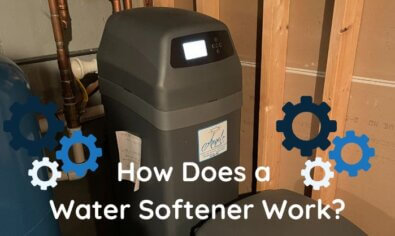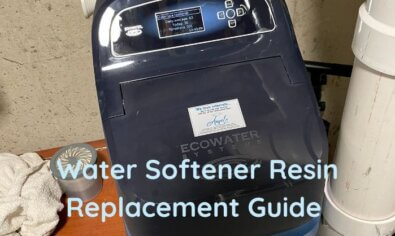How to Save Your Water Heater from Death by Calcium Buildup
This blog features the following key takeaways:
• Calcium buildup in a water heater is a common issue caused by hard water.
• This issue can lead to decreased water heater efficiency, higher energy bills and expensive damage.
• You can remove calcium buildup by flushing your water heater and treating it with a descaling solution.
• The best way to prevent calcium buildup from occurring is with a salt-based water softener.
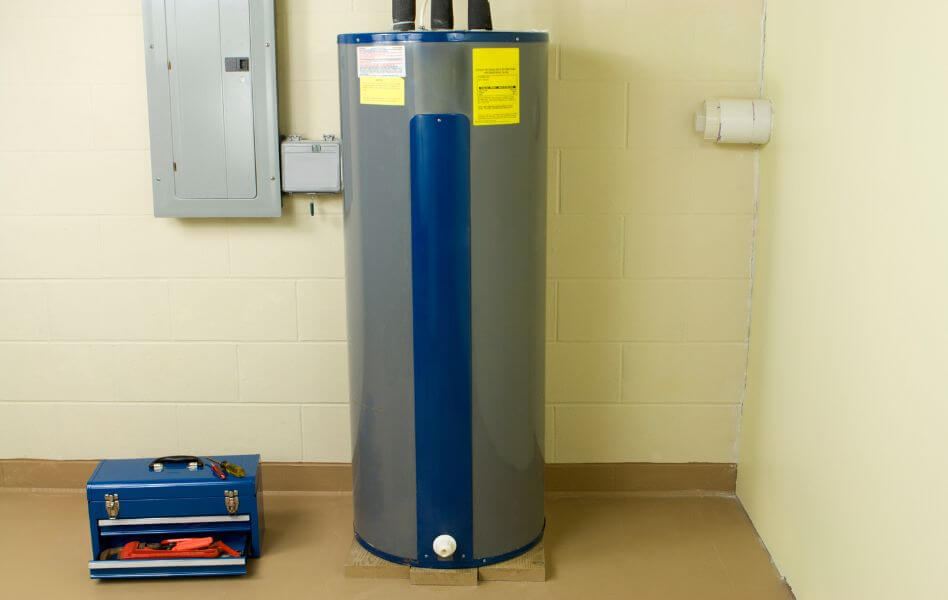
You wait forever for your shower to heat up then rush through it to avoid running out of hot water.
At the end of the month, your utility bills are sky-high.
On top of it all, you hear something banging around inside your water heater. But it’s not that old!
What’s going on?
You more than likely have calcium buildup in your water heater. The mineral is notorious for infiltrating water heaters and damaging them.
How does calcium buildup in water heaters happen, and how do you get it out and keep it out?
In this post, we’ll teach you everything you need to know about this problem, including how to prevent calcium buildup in your water heater for good!
What Causes Calcium Buildup in a Hot Water Heater?
This problem occurs because your water contains a lot of calcium. Calcium gets into water as it flows through the earth and encounters calcium-containing rocks, such as limestone, dolomite and gypsum. Because water is adhesive, it collects bits of calcium from the rocks as it flows over them.
Many regions in the United States have a lot of calcium-containing rocks beneath their soil. For example, the two regions we serve here at Angel Water, Northern Illinois and Southeast Florida, are both very limestone-heavy. So, if you live in Chicago or West Palm Beach, there’s a good chance you’re experiencing this problem, or you will.
Hard Water Contains Calcium
If you haven’t heard about the water in your region containing a lot of calcium, perhaps you know the issue by its other name: hard water. Water becomes hard when it contains more than one grain per gallon of calcium. Not only does hard water wreak havoc on your water heater, but it also causes several other problems around the home, including:
- Uncontrollable itching after you shower
- Cloudy dishes from the dishwasher
- Rust stains on clothes
- Low water pressure
- Scale buildup on other water-using appliances
- And more!
Most of the homes in this country have hard water and experience these problems every day, so you’re not alone.
Too Much Heat Creates the Issue
Why does all that calcium in hard water wind up clogging your water heater? The calcium separates out of the water when the water heater heats it up. The mineral deposits then drop to the bottom of the tank and cling to the heating element.
The more the calcium builds up over time, the worse things get for the water heater. The system must work harder to heat the water and has a shorter lifespan as a result. It also increases your energy bills because it requires more energy to heat the water. Plus, excess calcium buildup also puts the tank in danger of cracking and flooding your basement. Therefore, it’s essential to get this problem fixed sooner rather than later before it gets costlier!
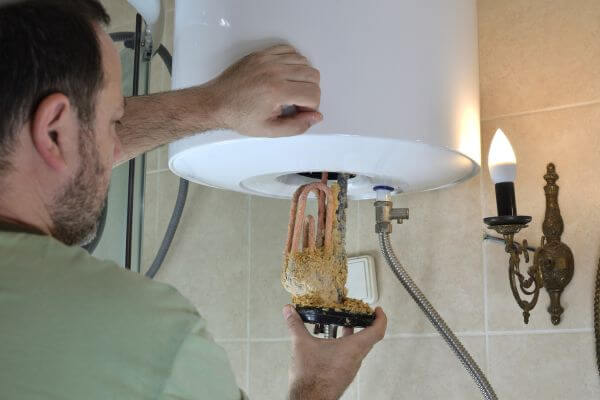
How Do You Remove Calcium Buildup in a Water Heater?
Don’t despair if you have gobs of calcium caking the inside of your tank. Here’s how to clean calcium buildup out of your water heater in two simple steps:
Flush Your Water Heater
Regularly flushing your water heater is essential for keeping your system healthy. Experts recommend flushing it at least once a year.
Protect Your Water Heater from Hard Water – Get a Free Test!
Hard water can lead to expensive repairs for your water heater. Get a free water test today to check your water quality and learn how to prevent damage to your heater and home.

You can safely flush your water heater by doing the following:
- Turn the heat valve all the way down so that it’s off.
- Shut off the water supply valve to relieve the pressure on the system.
- Connect a garden hose to the pressure relief valve at the bottom of the tank and put the other end of the hose in a bucket, floor drain or sump pump.
- Open the pressure relief valve and let the water drain.
- Remove the hose and close the pressure relief valve once the water heater is completely drained.
- Observe the water to see if it contains white flakes. The presence of white flakes is a sign of excess calcium buildup.
Descale the Tank
Flushing your tank will remove some of the calcium from your water heater. To get rid of the rest, you should treat the calcium with a descaling solution. You can find many descaling solutions at your local hardware store. However, an often cheaper and equally effective option is to use vinegar or lye.
Pour the descaling solution into your water heater and let it sit for a few hours (or however long the manufacturer recommends). Then flush your tank again before turning the water heater back on for reuse.
How Do You Prevent Calcium Buildup in a Water Heater?
What’s better than getting all that calcium out of your water heater? Answer: Keeping it gone! Here are two preventative measures you can take to stop lime buildup before it starts:
Monitor the Temperature
The hotter the water gets in your water heater, the more calcium buildup it will create. Therefore, it’s crucial to keep your system within the temperature range recommended by the manufacturer, which is typically between 120ºF and 140ºF.
Invest in a Water Softener
An even better preventative option is to get a water softener for your home. Water softeners use a process called ion exchange to pull calcium ions off water droplets. Thus, they intercept all the calcium before it can get into a water heater. Water softeners also prevent hard water from causing all the other problems we listed above.
Of course, you won’t get these benefits from just any water softener. The system needs to have a large enough capacity to handle your water’s hardness level and the amount of water your family uses. The most effective water softeners will also meet these specifications:
- NSF 44 certification for proven effective softening
- Salt-based rather than salt-free (salt-free conditioners reduce scale, but salt-based fully removes the rock from the water)
- 100% made in America by a trustworthy manufacturer
Need more assistance finding a system? Check out our guide to finding the best water softeners for your home.
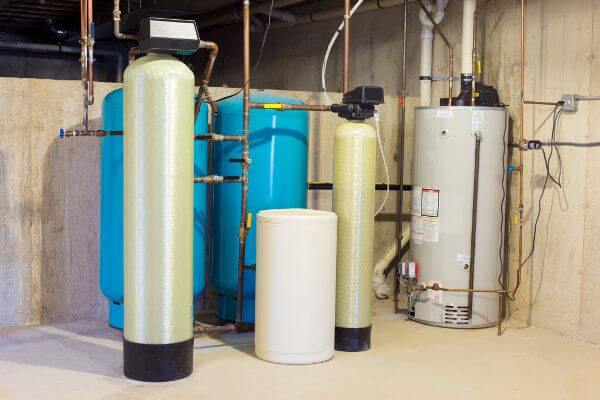
What If the Problem Isn’t Calcium?
We would be remiss if we didn’t mention that calcium buildup isn’t the only problem that can affect your hot water heater. There are also many other issues you should watch out for, which require regular maintenance.
Here are some of the most common problems:
- Malfunctioning thermostat
- The tank is too small for your home
- Leaky valves
- Faulty heating element
The best way to prevent issues like these from occurring is regular water heater inspection and upkeep. You should keep a close eye on your heater by checking it every six months or so. It’s also a good idea to get annual water heater maintenance from a licensed professional.
Need Help with Your Water Heater?
As you can see, calcium buildup is a serious problem for water heaters, but you can fix it by acting right away. Flush and descale your system to get rid of all that caked-on calcium. Then, once it’s clean, moderate the temperature of your heater and invest in a high-quality water softener to keep it gone.
Sound like a lot? The good news is you don’t have to handle any of this on your own. At Angel Water, we offer licensed maintenance to protect the health of your system. We also sell and install industry-leading water softeners and water heaters in the Chicago and West Palm Beach regions. Please call 847-382-7800 to get started!
Editor’s Note: This blog was originally published in December 2018 and updated in April 2023.
Protect Your Water Heater – Schedule an Appointment Now!
Prevent hard water damage and extend the life of your water heater. Schedule an appointment with our specialists today to explore water softening solutions for your home.

